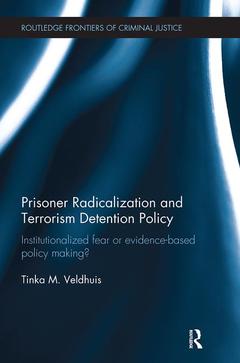Prisoner Radicalization and Terrorism Detention Policy Institutionalized Fear or Evidence-Based Policy Making? Routledge Frontiers of Criminal Justice Series
Auteur : Veldhuis Tinka

Correctional policies for Islamist violent extremist offenders are often based on the premise that prisons can be hotbeds of radicalization. The perception that inmates are susceptible to violent extremist belief systems has given rise to a fervent international public, political, and scholarly debate and has led to the introduction of drastic, often expensive policies to counter the threat of prison radicalization. But is the introduction of these policies justified?
A key question is whether violent extremist offenders should be concentrated in separate high-security prisons, or whether they should be integrated into the mainstream inmate population. Prisoner Radicalization and Terrorism Detention Policy argues that concentration strategies to manage violent extremist offenders are often flawed ? based on untested, potentially false assumptions that are rooted in fear rather than in facts. Little academic evidence has been produced that can valuably inform policy making in this area. As a result, policies to detain violent extremist offenders may be inadequately tailored to achieve their objectives, and could even lead to an intensification of the violent extremist threat.
This book is the first to present a detailed and systematic case study of the decision-making and implementation process behind terrorism detention policy. It will be essential reading for students, scholars and policymakers researching criminal justice, terrorism and extremism.
1. Prisoner Radicalization and Terrorism Detention Policy Part I: The Making of Terrorism Detention Policy—The Terrorism Wing 2. Agenda Setting and Policy Preparation 3. The Terrorism Wing in Theory Part II: Theoretical and Empirical Observations on Prisoner Radicalization 4. A Theory of Prisoner Radicalization 5. Terrorists in the Inmate Hierarchy Part III: Terrorism Detention Policy in Practice—Implementation of the Terrorism Wing 6. The Target Population 7. The Prison Regime Part IV: Captivated by Fear 8. Fear-Based Terrorism Detention Policy 9. A Realist Approach to Rehabilitation and Reintegration 10. General Conclusions and Discussion
Tinka M. Veldhuis is a researcher at the University of Groningen and a Research Fellow at the ICCT – The Hague, the Netherlands. Her research focuses on the analysis and evaluation of counter-terrorism policy, in particular prison policies and rehabilitation and reintegration programs for violent extremist offenders.
Date de parution : 02-2018
15.6x23.4 cm
Disponible chez l'éditeur (délai d'approvisionnement : 14 jours).
Prix indicatif 85,02 €
Ajouter au panierDate de parution : 05-2016
15.6x23.4 cm
Disponible chez l'éditeur (délai d'approvisionnement : 14 jours).
Prix indicatif 237,36 €
Ajouter au panierMots-clés :
Institutionalized Fear or Evidence-Based Policy-Making?; Prison Radicalization and Terrorism Detention Policy; Tinka Veldhuis; Islamist; violent extremist; incarceration; de-radicalization; rehabilitation; Terrorism Detention Policy; Terrorism Offenders; Prisoner Radicalization; Terrorism Wings; Vice Versa; Terrorism Detention; Violent Extremist Ideologies; Prison Radicalization; Terrorism Prisoners; Violent Extremist Offenders; Evidence Based Policy Making; Violent Radicalization; Maximum Security Unit; Concentration Policy; Terrorism Prison; Mohammed Bouyeri; Theo Van Gogh; Inmate Community; Prison Service; Prison Staff; Inmate Category; Concentration Model; Confinement Conditions; Deradicalization Programs; Decisive Governmental Action



